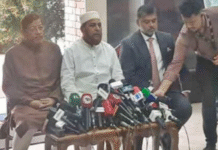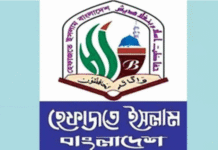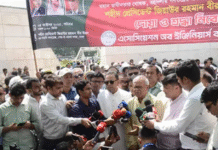It was in the mid-sixties, as a schoolboy, that I first started going to the movies. I recall this movie, Mayamriga, starring Uttam Kumar. He had a dialogue in the movie that I still remember, “There are some who are knowingly ignorant and others unknowingly ignorant.” That was quite a deep statement. After all, we don’t know everything, don’t understand everything. We all have our limitations. Yet there are times when we pose as know-it-alls and dispense knowledge to all and sundry. We make sweeping remarks. We don’t feel the need for proper analysis or detailed explanation. But there are exceptions when certain issues cannot escape public discussion and debate. The 2014 general election is one such instance, but we’ll come to that later.
I had been conversing with Mohammed Abdul Mobarak, a bold student leader of the sixties in Chittagong. He had read my columns in Prothom Alo and wanted to meet me. We talked about the 2014 election and the voter turnout. Mobarak shaheb had been an election commissioner at one point of time and so I was keen to hear his views. He imparted some interesting information about the past. In the 1920 polls in India, 178 contestants were elected uncontested. Mahatma Gandhi had boycotted that election and so it was one-sided in many places and in many places votes were not even required for the candidates to win.
There have been many elections since 1920 in this country. Many persons have been elected uncontested. But in 2014 when 153 persons were elected without votes, that caught attention. After all, there hadn’t been any such instance any time in the recent past. We discussed the election in detail and I gained a lot of food for thought.
Our forefathers freed the country in 1947 and there had been a provincial election. Then for the first time there was a general election in Pakistan in 1970. This election generated a wave of emotion and enthusiasm, what with the wave that swept the country for autonomy and self determination. A section of Moulana Bhasani’s National Awami Party (NAP) boycotted the election, followed suit by Ataur Rahman Khan’s Pakistan National League. The pro-Peking student front, Chhatra Union, also boycotted the 1970 DUCSU elections. The 1970 general election met with slogans of, “Kick out the ballot box!” and “Food before votes!” Their boycott hardly made a dent in the 1970 election. In fact, why the moulana called for this boycott, remains a mystery.
There have been 10 general elections in independent Bangladesh. The first two parliaments were dissolved by the forces in khaki. The parliaments couldn’t complete the full term. In the next elections there were several threats of boycott, such as in the elections of 1986, 1988, 1996 (15 February), and 2014. The parliaments after these elections were all short lived. Only the parliament after the 2014 election has remained firmly in place.
The mainstream political party BNP did not take part in the 1986 election. That parliament lasted for about a year or so. Almost all the mainstream parties boycotted the 1988 election and that parliament went on for two years. The parliament that was elected in the 15 February 1996 polls, lasted up to March. An analysis of these elections can lead to the conclusion that an elected parliament does not last long if the mainstream parties do not take part in the elections.
Is it simply because the elections were not participatory that the parliaments did not last? I think there is another serious reason. There had been strong anger and protest against these elections and the elected parliaments. The parliaments did not dissolve on their own. They were forced out. In the 1986 election, Awami League was forced to take up the opposition bench in parliament. Whatever the strategy may have been to get Awami League to join the election, it didn’t pay off in much dividends. They decided to resign within a year and President Ershad took that opportunity to dissolve the parliament.
Jatiya Party, JSD (Rab), JSD (Shahjahan Siraj), Freedom Party and a few other random parties may have taken part in the 1988 election, but by and large it was taken as a farce. Then in face of a mass uprising and with the armed forces withdrawing their support, Ershad’s government was toppled. Many of his ministers went into hiding in fear of public retribution. Experience indicates that if a government is toppled by mass uprising, the people search for the opposition and form a government with them.
History was created before our eyes in the 1990 mass movement where the government people went into hiding and the opposition too vanished. Awami League, Jamaat-e-Islami and Jatiya Party boycotted the 15 February 1996 election. They had been demanding a neutral caretaker government. In fact, everyone was part of this movement expect BNP and Freedom Party. The movement cut the parliament term short, while BNP tried to save face saying that the 15 February election was held simply to adhere to the rules. This was not wholly true. The parliament election in 1991 could have amended the constitution with support of the opposition. There was no need to waste public money to hold an ‘obligatory’ election. But under public pressure, that parliament couldn’t last.
The mainstream BNP and like-minded parties did not take part in the 2014 election. They boycotted the election and even declared resistance against it. Even so, the Awami League government went ahead and held the election. There were many centres were voting didn’t even take place and the turnout in other centres was sparse. Many within Awami League had said this was an obligatory election like the 15 February one. But later, when they saw their parliament has survived, they moved away from this stance.
Foreign powers had protested initially, but later accepted it and business carried on as usual. Many had predicted that that government would last six months, or a year at the most. These predictions proved wrong. The question is, if the other parliaments had tumbled down like a house of cards because of the boycotts, what is the secret behind the survival of the 2014 parliament. The explanation is simple, the element that is lacking this time is a mass uprising against the parliament.
Those who have their eyes and ears open, understand that those in power are uncomfortable about this parliament and questions remain in the public mind. Remaining in power for two consecutive terms, the government people have been displaying intolerance and all sorts of excesses in their behavior. This is no secret. Anger has grown within the public for several reasons. The government people and its forces have come down hard on the opposition and its allies. BNP is prohibited from holding meetings and rallies. But the fact remains that despite all this, BNP has been unable to bring the people to the streets. They may make a lot of noise at press conferences and at human chain programmes, but this isn’t generating a wave of public protest. That is why, after the first year of the 2014 government, it has managed to remain quite easily in the seat of power. It seems as if this parliament will also complete its full term.
For the first time in the political history of our elections we have noted that the mainstream political power has been unable to reap benefits of an election boycott. It is not known if BNP is discussing and debating among themselves over the issue. In 1976 when JSD was almost torn asunder by the state powers, the English weekly Holiday came up with an editorial. Referring to JSD, the editorial heading was ‘Political harikiri’. There had been a Japanese tradition to commit harikiri or suicide rather than face dishonour. But what happens here? BNP will be able to answer best.
Source: Prothom Alo









